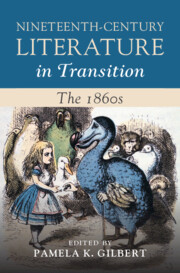Book contents
- Nineteenth-Century Literature in Transition: The 1860s
- Nineteenth-Century Literature in Transition
- Nineteenth-Century Literature in Transition: The 1860s
- Copyright page
- Contents
- Figures
- Contributors
- Introduction
- Chapter 1 Realism and Psychology
- Chapter 2 Sensational Bodies
- Chapter 3 Irish Rebellion on the Sensational Stage
- Chapter 4 Palgrave’s Golden Treasury
- Chapter 5 Impossible Monsters, Rabbit Holes, and New Worlds
- Chapter 6 Periodicals, Popular Fiction, and the Affordances of Digital Collections
- Chapter 7 Publishing in the 1860s
- Chapter 8 Italy in Transition
- Chapter 9 Silent Center, Vocal Margins
- Chapter 10 Empire and Evidence in Armadale and the Morant Bay Rebellion
- Chapter 11 Reading the Nonevental
- Chapter 12 An Age of Mythmaking
- Chapter 13 Reimagining Society
- Chapter 14 Historical Ecologies in Heterodox Economic Thought and Literary Realism of the 1860s
- Chapter 15 Extraction, Exhaustion, and the Sensation Novel of the 1860s
- Chapter 16 Evolution and the Human
- Bibliography
- Index
Chapter 5 - Impossible Monsters, Rabbit Holes, and New Worlds
The Unstable Ground of Science and Education in the Children’s Fairy Tale and Fantasy Literature of the 1860s
Published online by Cambridge University Press: 01 February 2024
- Nineteenth-Century Literature in Transition: The 1860s
- Nineteenth-Century Literature in Transition
- Nineteenth-Century Literature in Transition: The 1860s
- Copyright page
- Contents
- Figures
- Contributors
- Introduction
- Chapter 1 Realism and Psychology
- Chapter 2 Sensational Bodies
- Chapter 3 Irish Rebellion on the Sensational Stage
- Chapter 4 Palgrave’s Golden Treasury
- Chapter 5 Impossible Monsters, Rabbit Holes, and New Worlds
- Chapter 6 Periodicals, Popular Fiction, and the Affordances of Digital Collections
- Chapter 7 Publishing in the 1860s
- Chapter 8 Italy in Transition
- Chapter 9 Silent Center, Vocal Margins
- Chapter 10 Empire and Evidence in Armadale and the Morant Bay Rebellion
- Chapter 11 Reading the Nonevental
- Chapter 12 An Age of Mythmaking
- Chapter 13 Reimagining Society
- Chapter 14 Historical Ecologies in Heterodox Economic Thought and Literary Realism of the 1860s
- Chapter 15 Extraction, Exhaustion, and the Sensation Novel of the 1860s
- Chapter 16 Evolution and the Human
- Bibliography
- Index
Summary
Heralded as the decade that launched the “Golden Age” of children’s literature, the 1860s saw the growth of fairy tales, fantasy, and imperial romance, and concerns about education and empire. The 1860s major children’s fantasy works, Christina Rossetti’s Goblin Market[GK2] [GK3](1862), Charles Kingsley’s Water-Babies [GK4](1863), and Lewis Carroll’s Alice’s Adventures in Wonderland [GK5](1865), share striking similarities. The trope of unstable ground in these texts offers insight into the anxieties of the era with implications for education and imperial stewardship. The unearthing of fossils along with debates over Charles Darwin’s Origin of the Species[GK6] (1859) created unease about the unknown and disrupted established knowledge about the timeline for creation. Carroll’s, Kingsley’s, and Rossetti’s texts reveal uncertainties of science (especially the newly articulated domains of geology, paleontology, archeology, and geography), the inadequacies of education, and the legacy of empire. In their hands, unstable ground is not only a plot device and a metaphor, but a warning.
Keywords
- Type
- Chapter
- Information
- Nineteenth-Century Literature in Transition: The 1860s , pp. 94 - 110Publisher: Cambridge University PressPrint publication year: 2024

